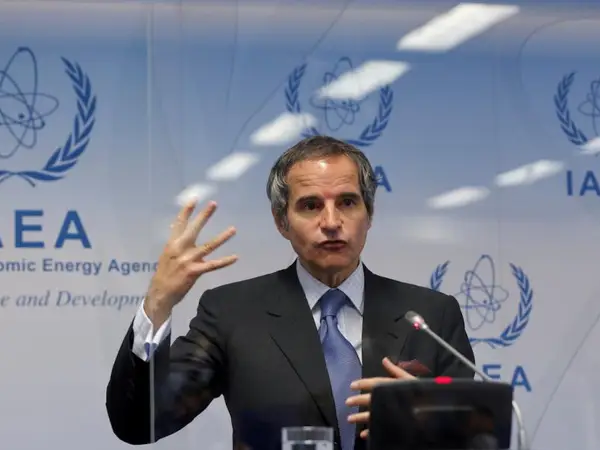The head of the UN atomic inspection agency said Tuesday he was expecting news on when he would visit Iran to resume talks over access to nuclear sites.
Rafael Mariano Grossi told the Financial Times Monday during a trip to Washington that a temporary arrangement for the International Atomic Energy Agency (IAEA) to monitor Iran’s nuclear sites was no longer “intact.”
Grossi told the newspaper he wanted an urgent meeting − “contact at the political level” − with Iran’s foreign minister Hossein Amir-Abdollahian to discuss surveillance arrangements. This reiterated Grossi’s request aired on the BBC Hardtalk program broadcast September 29 to meet with Amir-Abdollahian or President Ebrahim Raisi (Raeesi).
Cameras at Karaj?
Agency access in Iran is currently under a temporary arrangement reached September 12, but Grossi has expressed concern at Iran’s decision September 16 not to allow the changing of camera memory cards at the Tesa Karaj site, where Iran makes centrifuges used for enriching uranium. Iran says it is carrying out security investigation at the site following a June attack widely blamed on Israel.
The September 12 agreement extended the February arrangement Grossi reached after Iran reduced IAEA access to the basic level required under the Nuclear Non-Proliferation Treaty.The September agreement allowed the agency to replace camera memory cards, enabling it potentially to later “reconstruct” activities in Iran’s nuclear program.
But this in turn would require a wider agreement over restoring Tehran’s 2015 nuclear agreement with world powers, the JCPOA (Joint Comprehensive Plan of Action), which both limited Tehran’s nuclear activities and allowed the IAEA greater inspection access.
Raisi said Monday that Iran was serious about continuing talks in Vienna aimed at reviving the JCPOA but he gave no date for their resumption. There are increasing concerns in Europe and the United States that Tehran is gaining nuclear experience and perhaps trying to strengthen its negotiating position.
As Grossi met US Secretary of State Antony Blinken Monday, State Department spokesman Ned Price said the US did not see any need for an “intermediate” meeting between Iran and three European powers in Brussels, as was agreed by European Union foreign policy chief Enrique Mora in Tehran September 14.
Iran using Europe?
Some analysts suggest Tehran may see the three European JCPOA signatories – France, Germany, and the United Kingdom, the ‘E3’ – as a means to exert pressure on the US. Washington, which left the JCPOA in 2018, has taken part indirectly in the Vienna process, which are formally between the E3, Iran, China and Russia.
The Vienna talks, which began in April with the new US administration of President Joe Biden expressing a desire to revive the JCPOA, struggled to agree which US sanctions violate the agreement and exactly how the expanded and improved Iran nuclear program should be returned to JCPOA limits.
Grossi stressed to Hardtalk last month the link between inspections and the Vienna efforts to restore the JCPOA. “We are the guarantors…of whatever is agreed,” he said, noting that further limiting access “could mean we would start losing ground and start losing the capability to know exactly what is happening to the last detail…”
In his FT interview, Grossi said the current inspection arrangement was “seriously affected” and “not intact” while “not valueless either.” The IAEA board has a quarterly meeting in November, where pressure on Iran may build.
Israeli defense minister Benny Gantz, appearing before a parliamentary committee, cited Tuesday Iran’s nuclear program as justifying an increased defense budget. Israel’s channel 12 television reported Monday that $1.5 billion would be allocated for weapons to confront Iran. Israel is keen to procure US ‘bunker-buster’ bombs.
